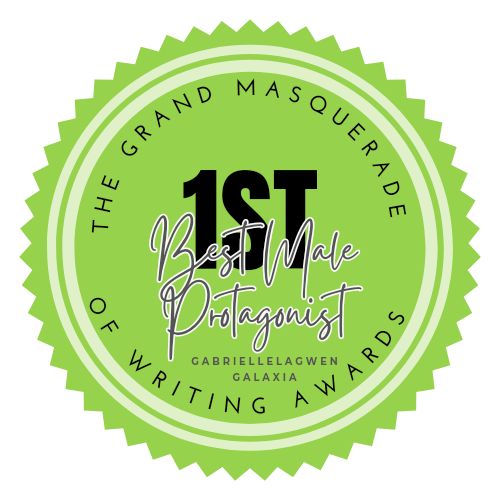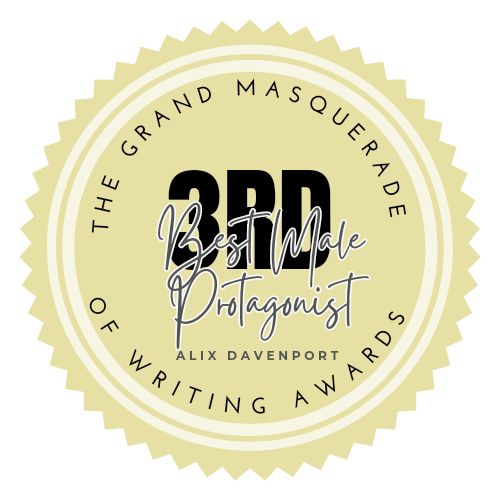𝐁𝐄𝐒𝐓 𝐌𝐀𝐋𝐄 𝐏𝐑𝐎𝐓𝐀𝐆𝐎𝐍𝐈𝐒𝐓 𝐑𝐄𝐒𝐔𝐋𝐓𝐒 & 𝐑𝐄𝐕𝐈𝐄𝐖𝐒🎭


1st WINNER: Secret of the Snow Queen( Fire and Ice book #1)
CHARACTER: KELVIN
CHARACTER PORTRAYAL: 09/10
REALISTIC TRAITS: 10/10
UNIQUENESS AND ORIGINALITY: 10/10
PERFORMANCE: 10/10
IMPACT: 09/10
TOTAL: 48/50
# Strengths
• Decisive and Action-Oriented: Kelvin takes charge in critical situations. When Aurora goes into labor and there's no midwife, he doesn't hesitate to help her despite his lack of experience. He prioritizes her well-being and makes quick decisions to ensure her comfort. (e.g., "I turned back towards the castle as the sun crept lower and lower.").
• Protective: Kelvin demonstrates a strong protective instinct towards Aurora. He chases Lord Petrov out of the room when he disrespects her privacy and guards her from emotional distress. (e.g., "Get out of this room before I kick your ass," I growled). Kelvin remains by Aurora's side throughout the birthing process and takes initiative to guard her room afterward.
• Compassionate: Despite his tough exterior, Kelvin shows genuine care for Aurora's well-being. He comforts her during childbirth, offers words of encouragement, and tries to alleviate her pain. (e.g., "The blood isn't important; all that's important is you and your baby being okay.").
• Resourceful: In the absence of a midwife, Kelvin improvises solutions to help Aurora through labor. He suggests changing positions to ease delivery and remains calm under pressure. (e.g., "Maybe the baby is shy; want to try to stand? It might help the baby come faster.").
• Loyal: Kelvin expresses loyalty to Luca, his cousin and friend. While frustrated with the council's treatment, he acknowledges their bond and considers staying for Luca's sake.
• Adaptive and Open-Minded: Despite initial reservations, Kelvin follows Sven's instructions regarding birthing positions based on historical practices.
# Uniqueness
• Outsider Status: Kelvin's background as a mercenary sets him apart from the nobility. He doesn't conform to their social norms and challenges their authority figures. (e.g., "I must be pretty expendable.").
• Internal Conflict: Kelvin grapples with his sense of belonging. He feels ostracized by the council and questions his role in the rebellion. (e.g., "I'm expendable to them! Haven't you been listening to anything I've been saying?").
• Emotional Vulnerability: Kelvin experiences a range of emotions throughout the excerpt, including shame, tenderness, and protectiveness. He doesn't shy away from expressing his feelings.
# Dialogue and Actions
Kelvin's actions speak louder than words. He prioritizes action over empty promises. His dialogue is direct and reflects his emotional state. He is respectful towards Aurora and Luca but firm with those who disrespect him or Aurora. (e.g., "See here, all you've done since you've come here is undermine me and throw protocol out the window.").
# Character Arc
The excerpt hints at a potential character arc for Kelvin. He might be questioning his purpose and place within the rebellion. This internal conflict paves the way for future development, where he might have to choose between his own desires and his loyalty to Luca.
# Reliability
Kelvin is a reliable source of action and support within the excerpt. He is present for Aurora during her difficult time and makes every effort to ensure her safety and well-being.
# Realistic
Kelvin's portrayal is believable. He is not a perfect hero but a man with flaws and uncertainties. He is uncomfortable with childbirth yet demonstrates a willingness to learn and help in any way he can. He is unsure of his place in the rebellion but demonstrates courage and compassion when faced with a critical situation.
# Positive Traits
• Decisive
• Protective
• Compassionate
• Resourceful
• Loyal (to Luca and Aurora)
# Negative Traits
• Impulsive
• Outspoken
• Lacks social graces
# Overall Character Sketch
Kelvin emerges as a complex and compelling protagonist. He walks the line between outsider and reluctant hero. His compassion and protectiveness shine through despite his outsider status and lack of experience in noble traditions. The excerpt lays the groundwork for an interesting character arc, where he might have to navigate his own desires alongside his growing bond with Luca and the rebellion. His internal struggles and emotional vulnerability make him a well-rounded character readers can root for.


2nd WINNER: ANCILLA
CHARACTER: MAGISTER
By SeraDrake
CHARACTER PORTRAYAL: 09/10
REALISTIC TRAITS: 09/10
UNIQUENESS AND ORIGINALITY: 10/10
PERFORMANCE: 09/10
IMPACT: 10/10
TOTAL: 47/50
# Strengths:
• Intellectual: Magister possesses a vast knowledge base, evident in his eclectic book selection that spans occult philosophy, poetry, history, and fiction. He even reads French literature in the original language. He's familiar with niche publications like Gnosis and Yellow Silk, showcasing his in-depth knowledge.
• Cultured: His taste in art, literature, and opera suggests a refined and sophisticated mindset. His appreciation for opera and classic literature like Emily Dickinson highlights his refined taste.
• Passionate: His love for specific topics like the Trojan War and his animated discussion of opera showcase his enthusiasm.
• Open-Minded: He readily acknowledges the controversial aspects of figures like Crowley and the problematic nature of some operatic characters.
• Well-Spoken: His hushed, warm voice is described as seductive and captivating.
• Multilingual: His ability to speak French adds another layer to his intellectual depth.
• Handy: His skill in baking chocolate chip cookies demonstrates a practical side.
• Experienced: The BDSM magazines and books in his collection suggest experience with this lifestyle. Magister demonstrates a deep understanding of BDSM practices, including the use of restraints and the pressure points for heightened arousal.
• Respectful: He obtains the narrator's consent before initiating anything physical.
• Submissive (potentially): He seems to readily accept the narrator's dominant role, even pleading with her to "take" him.
# Weaknesses:
• Shy/Reserved: Initially, he appears shy, evidenced by his quiet demeanor and awkward silences.
• Potentially Intimidating: His vast knowledge and controlled nature might create a barrier for some.
• Potentially Sadistic: His focus on pushing the narrator's limits and the pleasure derived from her discomfort hints at sadistic tendencies.
• Emotionally Unavailable: He prioritizes control and doesn't readily express his own emotions.
• Unclear Communication: He doesn't fully explain the implications of the BDSM dynamic before initiating physical contact.
# Uniqueness:
• Blend of Knowledge and Mystery: Magister's scholarly pursuits are juxtaposed with his interest in BDSM, creating a fascinating and unusual combination.
• Quiet Confidence: His reserved demeanor masks a passionate and knowledgeable individual.
• Undisclosed Practice: The details of his BDSM practices remain shrouded in mystery, piquing the narrator's (and the reader's) curiosity.
• Emphasis on Control: He prioritizes the narrator's internal control over vocalizations and outward expressions.
• Focus on Pleasure: While incorporating elements of discomfort, his primary aim seems to be building sexual pleasure.
# Dialogue and Actions:
• Knowledgeable: He shares his insights on occult philosophy, literature, and BDSM.
• Respectful: He uses polite language and avoids making assumptions about the narrator's desires.
• Affectionate: He displays moments of tenderness, kissing the narrator and holding her close.
• Passionate: His voice becomes animated when discussing topics he enjoys.
• Controlled: Despite his obvious attraction to the narrator, he maintains control of the situation until she expresses her desires.
• Submissive (potentially): He readily submits to the narrator's dominance, both physically and emotionally.
# Character Arc (Potential):
While the excerpt doesn't depict a drastic change, hints suggest Magister's potential development. He might become more open about his BDSM practices and desires as he grows closer to the narrator.
# Reliability and Realism:
The portrayal of a BDSM practitioner who is well-educated, respectful, and enjoys intellectual pursuits adds a layer of complexity to the stereotype. The existence of established BDSM communities with a focus on safety and consent adds to the character's believability.
# Positive Traits:
Intelligent
Cultured
Passionate
• Open-minded
• Well-spoken
• Multilingual
• Experienced
• Respectful
• Submissive (potentially)
# Overall Character Sketch:
Magister is a complex and intriguing character. His intellectual pursuits, quiet confidence, and experience in BDSM create a multifaceted personality. The glimpse into his knowledge, his passion for specific topics, and his moments of vulnerability add depth to his character. The dynamic between him and the narrator is intriguing, with a potential for a power exchange that is both consensual and emotionally charged.The portrayal avoids clichés and explores the emotional and intellectual aspects of BDSM alongside the physical. The unanswered questions about his BDSM practices and his motivations leave the reader wanting to know more.


3rd WINNER: RUSSIAN ROULETTE: FLASHBACKS
CHARACTER: PHOENIX
By: TheAlixDavenport
CHARACTER PORTRAYAL: 09/10
REALISTIC TRAITS: 09/10
UNIQUENESS AND ORIGINALITY: 09/10
PERFORMANCE: 08/10
IMPACT: 10/10
TOTAL: 45/50
# Strengths
• Confidence and Possessiveness: Phoenix displays a strong sense of self-assuredness. He takes ownership of Jace with pride after claiming him, evident in his "possessive pride" and the way he holds Jace close.
• Respectful and Open Communication: One of Phoenix's defining strengths is his emphasis on clear and respectful communication. He establishes ground rules for their dynamic, avoiding the use of contracts and emphasizing mutual understanding.
• Focuses on Commitment and Consent: Phoenix prioritizes Jace's willingness and avoids forceful control. The necklace serves as a symbolic representation of Jace's ongoing consent, and Phoenix respects Jace's right to decline intimacy when he chooses not to wear it.
• Protectiveness: Phoenix assures Jace of his safety and well-being within the club, taking responsibility for Jace's "welfare." Phoenix's strong desire to protect Jace is evident. He wants to understand Jace's past trauma to prevent future triggers and offers unwavering support.
• Emphasis on Consent: Phoenix continues to prioritize obtaining Jace's consent. He explicitly asks for permission before escalating physical contact and establishes a system of safe words to ensure Jace feels safe and in control.
• Emotional Vulnerability: While initially hesitant about Jace's reaction to his unconventional approach, Phoenix shows vulnerability by admitting his anxiety and relief at Jace's acceptance.
• Patient Communication: Phoenix demonstrates remarkable patience in calming Jace down after his panicked reaction. He prioritizes clear communication and avoids escalating the situation despite his own frustration.
• Empathy and Compassion: He shows genuine concern for Jace's emotional state and avoids using harsh punishments. His efforts to comfort Jace through touch and reassurance highlight his empathy.
• Respectful of Boundaries: Phoenix respects Jace's boundaries by asking permission before touching him and offering him choices like selecting his own beverage.
# Weaknesses
• Emotional Vulnerability: Despite his confident demeanor, Phoenix exhibits a hidden vulnerability. The thought of Jace leaving him someday troubles him ("he could not bear to think that a day like that would come").
• Potential for Manipulation: While Phoenix emphasizes consent, his control over the playroom environment and his possessiveness could be manipulative in certain contexts.
• Potential for Miscommunication: The shift in mood and predatory imagery used by the narrator might imply a disconnect between Phoenix's words and actions, raising questions about potential miscommunication.
• Emotional Volatility: The sudden, forceful nature of the kiss could be interpreted as a lapse in Phoenix's self-control, potentially undermining his emphasis on consent.
• Shared Pleasure: Phoenix emphasizes that his own pleasure comes from his partner's satisfaction, which is a refreshing take on Dom-sub dynamics that prioritizes mutuality.
# Uniqueness
• Redefining Dominant Roles: Phoenix challenges traditional Dom stereotypes. He rejects the use of collars as control mechanisms and views submission as a "gift" rather than something forced.
• Focus on Mutual Respect: The foundation of Phoenix's Dom approach hinges on mutual respect and understanding. He avoids the Dom-sub binary and prioritizes open communication for establishing boundaries.
# Dialogue and Actions
Phoenix's dialogue reveals his thought process and priorities. His actions, like giving Jace the option to decline intimacy and explaining his philosophy of Dom-sub dynamics, showcase his unconventional approach.
# Reliability and Realism
The portrayal of Phoenix walks a fine line between confidence and vulnerability, making him a somewhat realistic character. However, the idealized aspects of his emphasis on open communication and absolute respect for boundaries might not reflect the complexities of real-world Dom-sub relationships.
# Positive Traits
• Honesty and Transparency: Phoenix is upfront about his expectations and avoids hiding behind a forceful Dom persona.
• Empathy and Consideration: He prioritizes Jace's feelings and respects his right to choose.
# Negative Traits
• Possessiveness: While his possessiveness stems from his attraction to Jace, it could become controlling in certain situations.
• Potential for Emotional Manipulation: Phoenix's vulnerability about losing Jace could lead to manipulative behaviors in the future.
# Overall Character Sketch
Phoenix is a compelling Dom figure who challenges traditional expectations. He prioritizes open communication, mutual respect, and avoids using control mechanisms like contracts or collars. However, his possessiveness and emotional vulnerability hint at potential complexities in his approach. He prioritizes consent, communication, and respect for boundaries while also displaying emotional vulnerability and a surprising moment of aggression. This inconsistency raises questions about his self-control and the true nature of his Dom persona. The narrative leaves room for further exploration of his character development and the evolving dynamic between him and Jace.


CONGRATULATIONS TO YOU ALL!

OTHER REVIEWS:
LOVE AT DAWN
CHARACTER: ANDRE
By: LiebeKlara
CHARACTER PORTRAYAL: 08/10
REALISTIC TRAITS: 08/10
UNIQUENESS AND ORIGINALITY: 09/10
PERFORMANCE: 08/10
IMPACT: 08/10
TOTAL: 41/50
# Strengths:
• Talented Artist: His skill is evident from the detailed descriptions of his paintings and Edith's enthusiastic reaction to his portrait of her.
• Compassionate: He gives bread and milk to the homeless children, showing a genuine concern for their well-being.
• Observant: He notices Edith's intelligence and her mischievous glint in her eye.
•Articulate: He expresses his complex thoughts and emotions clearly.
• Patient Teacher: Andre recognizes Edith's potential and patiently guides her intellectual development.
• Knowledgeable: His extensive library speaks to his own love of learning and diverse interests.
• Supportive: He encourages Edith's inquisitive nature and critical thinking.
• Passionate: His dedication to his art and his conviction for change are evident in his work ethic.
# Weaknesses:
• Secretive: There's a sense of mystery surrounding him. His age and past remain unclear. He offers no explanation for his departure, leaving Edith confused and hurt.
• Melancholic: He has a weathered look and carries a melancholic air, hinting at past struggles.
# Uniqueness:
• Juxtaposition of Youth and Maturity: Despite his young age, Andre exhibits a depth of thought and compassion uncommon in someone his age.
• Artistic Sensibility: He sees the world through the lens of an artist, finding beauty and meaning in everyday scenes.
• Guilt-Ridden: He feels guilty about not being able to help the poor children more.
• Unorthodox Educator: Andre's approach to education is far removed from traditional methods, fostering critical thinking and independent learning.
• Dual Identity: He juggles commercial art for survival with his own artistic passion projects.
# Dialogue and Actions:
• Reserved: Initially, he's quiet and withdrawn, especially with Edith.
• Passionate: His voice becomes hoarse with emotion when he talks about the city's scars.
• Protective: He gently pushes Edith's hair back, a gesture that suggests a fondness for her.
# Character Arc:
Andre transitions from a distant figure to a more open and relatable character. His interactions with Edith allow him to express his vulnerabilities and social conscience.
# Reliability and Realism:
The portrayal of a struggling artist with strong social views aligns with some real-life artists. However, the extent of his melancholy and his secretiveness might be more fictional.
# Positive Traits:
• Talented
• Compassionate
• Observant
• Articulate
• Independent
# Negative Traits (Potential):
• Secretive
• Melancholy
• Self-deprecating
# Overall Character Sketch:
Andre is a captivating young artist who hides a well of emotions and social awareness beneath his youthful facade. His artistic talent and compassion are balanced by his melancholic nature and guarded personality. The budding connection between him and Edith promises to further explore his complexities. Andre has a profound impact on Edith. He ignites her intellectual curiosity and provides her with the tools to think critically. However, his sudden disappearance leaves her feeling abandoned and confused.
# Impact on Others:
Andre challenges Edith's perception of the world. His artistic perspective and social commentary awaken a sense of awareness in her.
# Room for Growth:
Andre's journey could involve confronting the source of his sadness and finding a way to reconcile his artistic pursuits with his social concerns. His relationship with Edith has the potential to provide him with emotional support and a sense of belonging. Did he leave to pursue his art? Was there a threat that forced him to disappear? Understanding his reasons for leaving would provide closure for Edith and the reader. Additionally, exploring Andre's artistic style and the messages he tries to convey through his art would offer further insight into his character.


STAY TUNED!

Bạn đang đọc truyện trên: AzTruyen.Top